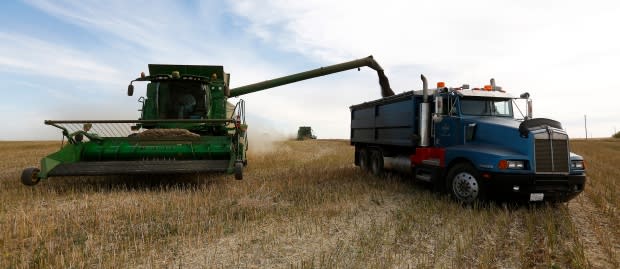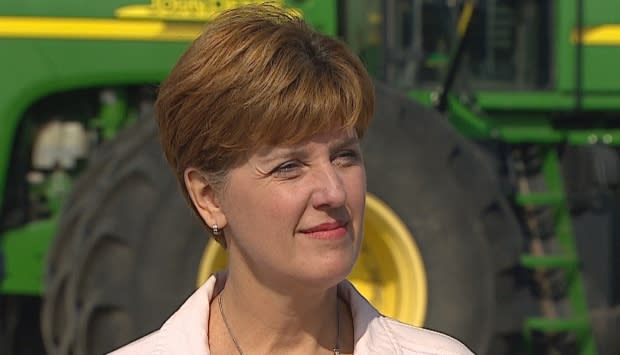Ottawa invests $13M to diversify, grow Canada's grains and oilseeds exports
The federal government is investing millions into diversifying the Prairies' grain and oilseed industries as China continues to put up hurdles to Canadian farm exports, including canola.
Agriculture Minister Marie-Claude Bibeau announced Thursday a $13-million investment into programs to grow and diversify Canada's grain sector.
"With one of every two bushels of grain grown here on the Prairies bound for export, export markets are the lifeblood for growth and prosperity," Bibeau said during a news conference at the Chitwood farm in Airdrie, Alta.
The announcement comes just one day after the minister announced an $8.3-million investment into Canada's beef industry, aimed at growing its international market reach.
Both investment projects are being rolled out amid Canada's trade standoff with China — but Bibeau told CBC News that the government has long been working with the agricultural sector to diversify its exports.
She said Ottawa wants to continue working with the industry to develop new market opportunities and add more value to the country's grain sector.
The investment will fund industry-led projects through the Canadian Agricultural Partnership AgriMarketing Program, which helps industry grow and diversify exports to international markets.
Investments in everything from flax to soybeans
The Canola Council of Canada will receive more than $4 million of new funding to boost exports to new and existing markets with a focus on Canadian flax.
Both Pulse Canada and the Canadian Special Crops Association are getting about $3 million each. Funding for Pulse Canada will help boost its sales while the association funding will improve rail service so pulse and special crops industries can better compete in global markets.

The government is also earmarking $1.4 million for the Canadian Malting Barley Technical Centre to grow barley exports.
The remaining funding will go to Cereals Canada projects — about $900,000 — to grow global markets for Canadian wheat, as well as $700,000 being set aside for individual oats, barley and soybean growers.
Trade barriers an ongoing challenge
Trade barriers put up by Italy, India and China, as well as drought-like conditions, have proven challenging for farmers across Western Canada in recent years.
The latest investment will help the sector take advantage of the Canada-European Union Comprehensive Economic and Trade Agreement and the Comprehensive and Progressive Agreement for Trans-Pacific Partnership, according to a government release.
The release states that in total, Canada's free trade agreements give producers access to an estimated 1.5 billion consumers in more than 50 countries.

"Our Prairies' grain and oilseeds farmers are a powerhouse of our economy and the backbone of rural communities," Bibeau said.
Canada is the fifth largest exporter of agricultural and agri-food products in the world, with exports at about $56-billion a year, according to the Canadian Agri-Food Trade Alliance.
The Liberals want to grow agricultural exports to $75 billion by 2025.


